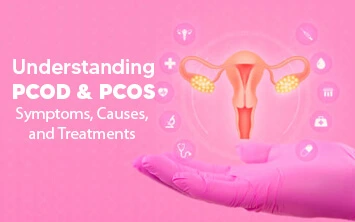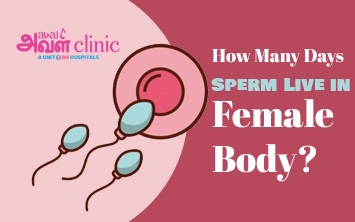Published on: August 9, 2025
Author: Admin
What Is the FSH Hormone?
The FSH (follicle-stimulating hormone) and LH (luteinizing hormone) are found in both men and women. These hormones play a role in regulating their reproductive processes. When we refer to reproductive processes, we are talking about the ovaries and testes. For a better understanding, both FSH and LH hormones are helpful in stimulating the ovaries to produce follicles in women. On the other hand, they are also helpful in stimulating the testes to produce sperm in men.
FSH and LH hormones are frequently found together as they work collaboratively in sexual development and reproduction. The anterior pituitary gland, which is found in the human brain, produces FSH and LH hormones, along with other hormones. The levels of these hormones are typically determined through blood tests.
Unlike ovarian reserve and AMH (anti-Müllerian hormone), which may generally remain constant across the menstrual cycle, FSH levels tend to fluctuate constantly. This is because of its natural responsibility in stimulating the reproductive organs of both women (ovaries) and men (testes) and regulating the menstrual cycle. Hence, the FSH levels are measured only in the early days of the menstrual cycle, often between days 2 and 4.
Conversely, FSH levels in men do not generally fluctuate across the day or month, as they do in women. Instead, their levels may vary over a longer period because of age or medical conditions. Hence, the FSH levels in men are measured at any time of the month.
This blog is here to provide deeper insights into FSH levels for couples who wonder, “What is a normal FSH level to get pregnant?”.
What Is A Normal Fsh Level To Get Pregnant?
FSH (follicle-stimulating hormone) is an important factor for couples trying to conceive, particularly through fertility treatments like IVF. They help determine the reproductive health of both men and women. The imbalances in its level can largely have a negative impact on achieving conception, either through fertility treatments or naturally.
In women of menstrual years, FSH levels ranging between 4.7 and 21.5 mIU/mL (milli-international units per millilitre) are considered normal. FSH levels below 10 mIU/mL are considered optimal for achieving conception, although when measured only on the first few days of the menstrual cycle. It is significant to understand that these levels can fluctuate constantly based on an individual’s hormonal balance, age, and medical conditions.
The following tabular column comprises different FSH levels of a woman across her life.
| Phase | FSH Levels |
|---|---|
| Before puberty | 0 to 4.0 mIU/mL |
| During puberty | 0.3 to 10.0 mIU/mL |
| Reproductive years | 4.7 to 21.5 mIU/mL |
| After menopause | Above 25.8 mIU/mL |
FSH Levels in Women
It is well understood that the FSH levels tend to fluctuate throughout the month. To be more exact, the FSH levels may become typically low during the initial days of the menstrual cycle. On the contrary, they may gradually rise as days progress.
Normal FSH levels in women
The following is the approximate FSH value of the menstrual cycle phases.
| Phase | FSH Levels |
|---|---|
| Follicular Phase (days 1-14) | 1.4 to 9.9 mIU/mL |
| Ovulation (around Day 14) | 6.2 to 17.2 mIU/mL |
| Luteal Phase (days 15-28) | 1.1 to 9.2 mIU/mL |
FSH and Fertility
According to fertility specialists, FSH levels ranging below 10 mIU/mL are considered optimal to achieve pregnancy, either naturally or with the help of fertility treatments. This range typically signifies a good ovarian reserve. The good ovarian reserve refers to having finely qualified and quantified eggs in a woman’s ovaries. They also refer to their potential to get fertilised with sperm.
The range above 15 mIU/mL can indicate diminished ovarian reserve, which can usually happen in an aged woman or due to certain medical conditions. This may significantly disrupt the ability to achieve conception.
Fertility treatments like IVF can be significantly helpful in regulating FSH levels. This can predominantly heighten the chances of conception. This is possible as the procedure involves customising the FSH hormone medications according to each individual’s circumstances. The major role of FSH hormonal medications is to stimulate the ovaries to produce more eggs. This is a common treatment protocol in the IVF procedure to maximise the success rates.
During pregnancy, the follicle-stimulating hormone (FSH) may become typically low, often ranging below 0.3 mIU/mL. This range is medically considered normal.
FSH Levels in Men
Follicle-stimulating hormone (FSH) in men, together with luteinizing hormone (LH), helps regulate the production of sperm throughout his life. It is also helpful in making sure of sperm health. In an adult man, FSH levels ranging between 1.5 and 12.4 mIU/mL are considered normal. The levels ranging above 13 mIU/mL may indicate the underlying problems with the testes. Likewise, lower levels ranging below 1.5 mIU/mL may signify certain issues with the pituitary gland.
Normal FSH levels in men
The following are the approximate FSH levels at different phases of a man’s life.
| Phase | FSH Levels |
|---|---|
| Before puberty | 0 to 5.0 mIU/mL |
| During puberty | 0.3 to 10.0 mIU/mL |
| Adulthood | 1.5 to 12.4 mIU/mL |
FSH and Fertility
If a man is found with infertility issues because of abnormal FSH levels, treatments like IVF are used in combination with hormonal medications and hormone replacement therapies. They may also involve lifestyle modifications. These hormonal medications are used to regulate the FSH levels in men to maximise the chances by improving sperm production.
Need expert advice? Consult our doctors now!
Call Now: 80047 80048What Do the Abnormal FSH Results Mean?
In a woman:
The higher levels of FSH may mean any of the following factors. They may indicate:
- The incomplete growth or dysfunction of the ovaries
- The presence of ovarian cysts
- Polycystic ovarian syndrome (PCOS)
- Primary ovarian insufficiency (POI)
- Genetic disorders like Turner syndrome
- Adrenal gland disorders
- Thyroid conditions
- Menopause or perimenopause
- Autoimmune diseases
- Cancer treatments like radiation and chemotherapy
Whereas, the lower levels of FSH may mean:
- Issues in the hypothalamus or the pituitary gland
- Losing weight rapidly
- Being underweight
- Problems with ovulation
In Men:
The higher levels of FSH may mean any of the following factors. They may indicate:
- Benign or malignant germ cell tumours
- Presence of mumps
- Genetic disorders like Klinefelter syndrome
- An injury to the testicles
- Autoimmune diseases
- Cancer treatments like radiation and chemotherapy
Whereas, the lower levels of FSH may mean:
- Disorders in the hypothalamus or the pituitary gland
- Elevated prolactin
- Excess androgens
- Losing weight rapidly
- Being underweight
How can an FSH Levels Test Benefit Fertility?
A follicle-stimulating hormone (FSH) test can provide numerous benefits to couples. Through the levels of FSH hormone, the healthcare provider would be able to narrow down the cause of infertility. Based on it, they might be able to prepare an appropriate treatment plan for better fertility outcomes. However, the testing methods to determine the FSH levels may vary depending on the individual’s age, sex, and medical conditions.
In women, the FSH levels are beneficial in determining:
In Women
The FSH levels are beneficial in determining:
- Underlying cause of infertility
- The reasons for disruptions in the normal functioning of the ovaries
- The reasons for irregular periods
- The reasons for the stopped or missed periods at the reproductive age
- Ovarian reserve
- A woman's likelihood of pregnancy
In Men
The FSH levels are beneficial in determining:
- Underlying cause of infertility
- The cause of disruptions to normal testicular function
- The existence of any medical conditions
Summary
Follicle-stimulating hormone (FSH), together with luteinizing hormone (LH), plays a crucial role in regulating the reproductive function of both men and women. They are essential in regulating the ovulation, menstrual cycle, and sperm production. Imbalances in the levels of FSH hormone can predominantly disrupt the normal functioning of their gonads (ovaries and testes).
Understanding the meaning of FSH levels and their impact on fertility can largely help couples to make informed decisions that are necessary for their fertility health.
Experts at Aval Clinics are well-skilled in regulating the FSH and LH hormones as part of fertility treatments. Make an appointment to have an open communication with us.
If you still have any concerns, having a consultation with experts at Aval Clinics is recommended. They can guide you.
Contact us today for expert advice and personalized care:





























